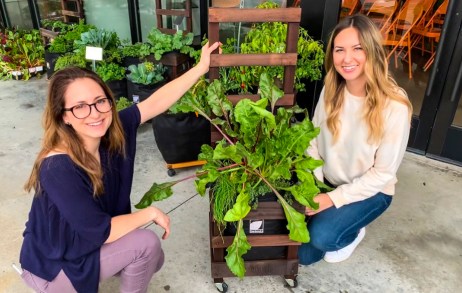After a couple of months, your garden has grown and has likely made quite a mess of itself. So let’s discuss the importance of cleaning up your garden.

Just like any home, we want to make sure we are providing our plants a happy, healthy home to grow.
Gardens will need minor, but, routine maintenance throughout each growing season. They have few problems with insects; in fact, many of them naturally repel pests.
However, to keep those pests from becoming interested in your garden, you’ll want to build in a simple garden hygiene routine to keep your garden pest- and disease-free through the season.
Tidy up the mess.

Remove any dead leaves or decaying plant material in the grow bag and any dead leaves or stems on the plant. This alone will help increase the oxygen flow and make sure the plants aren’t spending lots of energy trying to save a damaged stem or leaf.
Haircuts – aka prune the unattractive plant dead-ends.
Eventually, older stems will show signs of less new growth and begin to look dull, long and leggy. We’d rather avoid that all together… The best thing to do is prune these stems back to where new growth begins to let your plant know you are ready for it to grow more flavor-packed, young leaves.
If you don’t prune or harvest regularly, you’ll wind up with older, more bitter herbs and possibly even flowered and seeded herbs. If your herb flowers have bloomed and seeded, you’ve made some bees and butterflies very happy, but that plant is no longer edible. You can either choose to let it keep feeding the pollinators and enjoy their beautiful dance or replace that plant with a new one to enjoy in your food and drink.
If you are looking for a few herb replacement plants you can visit Gardenuity or ask your GrowPro for suggestions at GrowPro@gardenuity.com.
Feeding.

Herbs need minimal nutrients to thrive. This week feed your herb garden with the second nutrient packet sent with your kit. Remember to mix it with water and spray the leaves well. Pour the remaining liquid directly on the base of your plants. Feed in the early morning or late evening.
Seasonal Monitoring
Don’t forget to start paying attention to the weather changes and how that impacts your garden. Most herbs love as much direct sunlight as they can possibly get.
Not all herbs can handle the constant freezing temperatures of northern winters or scorching heat of the south’s summers. So, it’s a good habit to monitor your garden for stress.
However, if you start seeing leaves with dried brown edges, your garden likely needs less direct sun in the afternoon.
More sun means more heat and evaporation, so you’ll want to monitor the soil moisture more frequently again and adjust your water schedule with the increase in temperatures.
If you have any questions don’t forget to reach out to your Grow Pro at GrowPro@gardenuity.com
